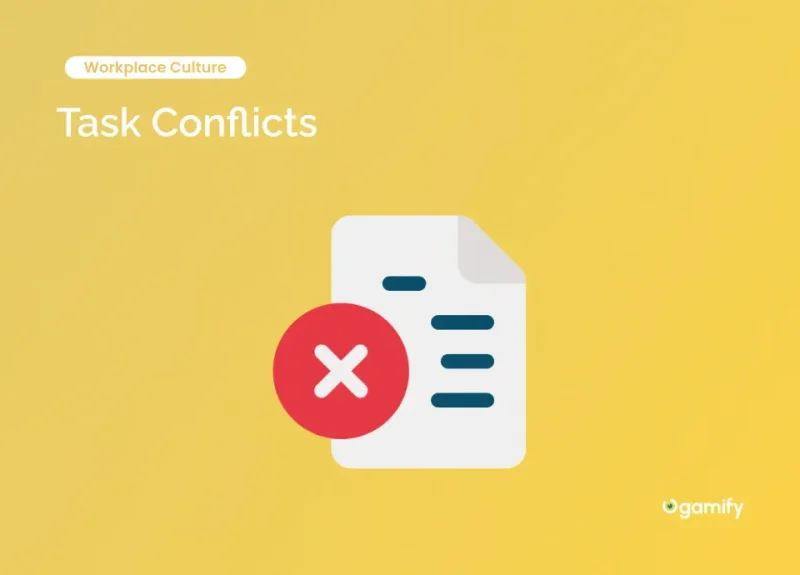Task conflicts are a common occurrence in the workplace. You may have encountered it when you and a coworker couldn’t agree on how to handle a certain project or assignment, which frequently resulted from different priorities, processes, or directions. Miscommunications, different working methods, or divergent viewpoints on how to finish tasks are just a few of the causes of these confrontations.
While it might seem counterproductive, task conflicts aren’t necessarily bad. In fact, when used properly, they can aid in the exploration of many viewpoints, promote creativity, and eventually aid in the discovery of the finest solutions for you and your team. Of course, how you and the parties involved manage and settle these issues is the crucial factor.
Explore the causes and effects of task conflicts in the workplace as we explore some successful techniques for resolving them in order to maximize productivity and preserve productive working relationships.

What is Task Conflict?
Let’s talk about task conflicts in the workplace. You know, those pesky issues that arise when people can’t agree on how to accomplish work tasks? Task conflicts usually stem from differences in attitudes, needs, or behaviors within an organization. They can happen in any work area, but let’s break down some common situations where they might pop up.
Think about a scenario where you and your coworker disagree over how to allocate resources or there is a dispute about rules and regulations. That’s task conflict. It may also occur if there is a dispute over how to interpret the facts or if you are managing expectations at work.
So, why should you care? Well, understanding task conflict can help you come up with strategies to resolve it, and even benefit from it. That’s right – addressing task conflict can lead to better team building and improved collaboration.

First, keep in mind that disagreements can happen in any workplace. It all depends on how you respond to them. If you have a different viewpoint or believe a problem may be handled better, don’t be hesitant to speak out. Open communication can be essential in resolving task disagreements.
Likewise, don’t take anything personally. Everyone has unique perspectives because of their experiences and upbringing, and that is a wonderful thing! You may improve your problem-solving abilities and create a more welcoming and supportive workplace if you can resolve task conflicts and reach an understanding with your coworkers.
And finally, be adaptive. A task conflict can occasionally inspire you and your team to come up with a new, more effective method of completing a task. So, keep an open mind and welcome the chance to gain knowledge and experience from these interactions.

Examples of Task Conflict
Sometimes, you might find yourself facing task conflicts in your workplace and wonder what they look like in real-life situations. Here are some examples of task conflict to help you recognize them:
Allocation of Resources: You and your teammates might disagree on how resources, such as budget, materials, or even personnel, should be distributed across different projects. This can create conflict if you prioritize different project objectives or have different expectations for the outcome.
Unclear Expectations: Imagine you delegate a task to a team member but don’t clearly communicate your expectations. If they perform the task incorrectly because they didn’t fully understand your directions, it’s an example of task conflict.

Disagreements on Policies and Procedures: When teammates have different opinions surrounding organizational policies or project procedures, it may lead to a task conflict. For example, you might believe that weekly progress report meetings are necessary for communication, while another teammate might see them as time-consuming and counterproductive.
Task-based Conflicts in Teamwork: In some situations, team members rely on each other to complete a task or project. If one person on the team doesn’t complete their part of the task on time, it can affect another team member’s ability to finish their part, leading to task conflict.
Remember, recognizing task conflicts early on and addressing them in a casual and open manner can help prevent larger issues from arising. Don’t be afraid to discuss these conflicts with your team to ensure that everyone’s on the same page and working together towards common goals.

5 Tips How to Resolve Task Conflicts
Facing task conflicts at your workplace? Don’t worry. These tips can help you navigate your way to resolving them effectively.
First up, focus on communication. Open and honest communication is crucial when resolving task conflicts. Make an effort to understand your teammates’ perspectives and listen actively, which means not only hearing but also interpreting and responding to the information they share.
Next, try to identify the root causes of the conflict. Start by discussing the conflicting objectives, priorities, or work tasks associated with the problem. Be mindful of any personality clashes or misunderstandings that may be complicating the situation and address them separately to avoid confusing task conflicts with relationship conflicts.

It’s essential to maintain a respectful and professional attitude during the conflict-resolution process. Show empathy towards your team members by acknowledging their feelings, even if you have differing opinions on the matter. Remember, fostering teamwork and a positive work environment is crucial for productivity and morale.
To resolve the issue, collaborate and brainstorm strategies that benefit the entire team. Look for a compromise or a win-win solution that takes everyone’s opinion into account. Encourage the team to focus on common goals and the bigger picture, rather than getting stuck in the nitty-gritty details of the disagreement.
Set aside enough time and money to make sure that everyone is on board with the new course of action. Maintain open lines of communication so that everyone involved is aware of any modifications or changes being made during the resolution.

When the conflict begins to subside, solicit feedback from your teammates about what worked and what didn’t, so that any improvements can be made for future situations. Learning from these experiences can help you and your team handle conflicts more effectively and maintain healthier interactions in the long run.
Last but not least, if all else fails and the task dispute persists, think about bringing in an unbiased mediator who can guide the discussion and achieve an amicable resolution for everyone.
Therefore, with the help of these suggestions and a little perseverance, you may learn the skills necessary to resolve task conflicts, increase workplace productivity, and foster a positive work atmosphere. Good luck!
Conclusion
In wrapping up, you’ve now gained a better understanding of task conflicts and their impact in the workplace. Remember, task conflicts typically arise from disagreements over how to accomplish work tasks, and can stem from differing attitudes, needs, or behaviors within an organization.
Embrace these conflicts as an opportunity for growth and constructive discussion, rather than a source of tension. When handled well, task conflicts can encourage the exchange of ideas and lead to improved decision quality within your team.
As you continue to navigate task conflicts in your own work environment, try applying some effective conflict resolution techniques. Communication is key, so be open to hearing other perspectives and seek compromise when appropriate. By fostering a positive work environment and embracing the potential benefits of task conflicts, you can help your team thrive and reach its full potential.
FAQ
What is task conflict?
Task conflict refers to disagreements or disputes that arise in the workplace when individuals have different viewpoints, attitudes, or behaviors regarding how to accomplish work tasks.
What are some examples of task conflicts?
Examples of task conflicts include disagreements over resource allocation, unclear expectations when delegating tasks, differing opinions on organizational policies or project procedures, and conflicts arising from interdependent tasks within a team.
How can task conflicts be resolved?
Task conflicts can be resolved by focusing on open communication, identifying the root causes of the conflict, maintaining a respectful and professional attitude, collaborating to find win-win solutions, ensuring clarity and understanding among team members, and seeking the assistance of a mediator if necessary.
Why is it important to address task conflicts?
Addressing task conflicts is crucial because it fosters a positive work environment, improves teamwork and collaboration, prevents larger issues from arising, enhances productivity, and enables the discovery of better solutions through the exchange of ideas.
What are the benefits of effectively resolving task conflicts?
Effectively resolving task conflicts leads to improved decision-making, increased workplace productivity, stronger working relationships, better understanding of diverse perspectives, enhanced problem-solving skills, and the development of a positive and supportive work atmosphere.

